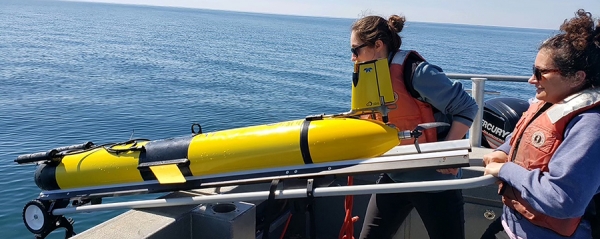Windsor, Ont. – Participating in a new nationwide scientific freshwater observatory will help to secure the University of Windsor as a leader in freshwater research, says Aaron Fisk.
Professor and Canada Research Chair in Changing Great Lakes Ecosystems in the School of the Environment, he also serves as scientific director of the Real-Time Aquatic Ecosystem Observation Network (RAEON) — a key component of the new Global Water Futures Observatories.
Awarded $40.67 million, with $15.3-million from the Canadian Foundation for Innovation through the Major Science Initiative, the GWFO comprises instrumented observation in 64 basin, lake, glacier, river, and wetland sites; 15 deployable water measurement systems; and 18 water laboratories. Its meteorological, glaciological, hydrological, water quality, and freshwater data will inform the development of water prediction models, diagnosis of risks to water security, and solutions to ensure the long-term sustainability of resources across Canada.
It is led by the University of Saskatchewan and in addition to Windsor, includes researchers from seven universities: Waterloo, McMaster, Toronto, Wilfrid Laurier, Carleton, Western, and Trent.
“This network will give scientists from the University of Windsor new mechanisms for collaboration with other leading freshwater research universities and participating in large-scale projects and grant applications,” says Dr. Fisk.
The advanced monitoring capabilities will support Indigenous communities, governments, industry, and agriculture in developing policies to secure their futures in a time of rapid climate change and threats to freshwater ecosystems.
RAEON will receive a share of the CFI grant, funding it through 2029.
“Our researchers will leverage this infrastructure to provide expertise in water utility management, harmful algae blooms, nutrient dynamics, environmental genomics, fish ecology, oil and gas sources, and contaminant fate,” Fisk says. “We will provide knowledge and leadership for the study of large freshwater ecosystems around the world.”
Shanthi Johnson, UWindsor vice-president, research and innovation, emphasized the importance of the federal investment.
“Funding through the Major Science Initiative is very competitive, with only 19 projects nationwide,” she said. “This support showcases our network’s excellence and crucial role in addressing climate change. We are deeply grateful for this investment, which will significantly impact our ability to safeguard water resources for future generations.”
A launch event Wednesday took place online from Saskatchewan, with an in-person gathering at the Great Lakes Institute for Environmental Research. Learn more on the Global Water Futures website.









